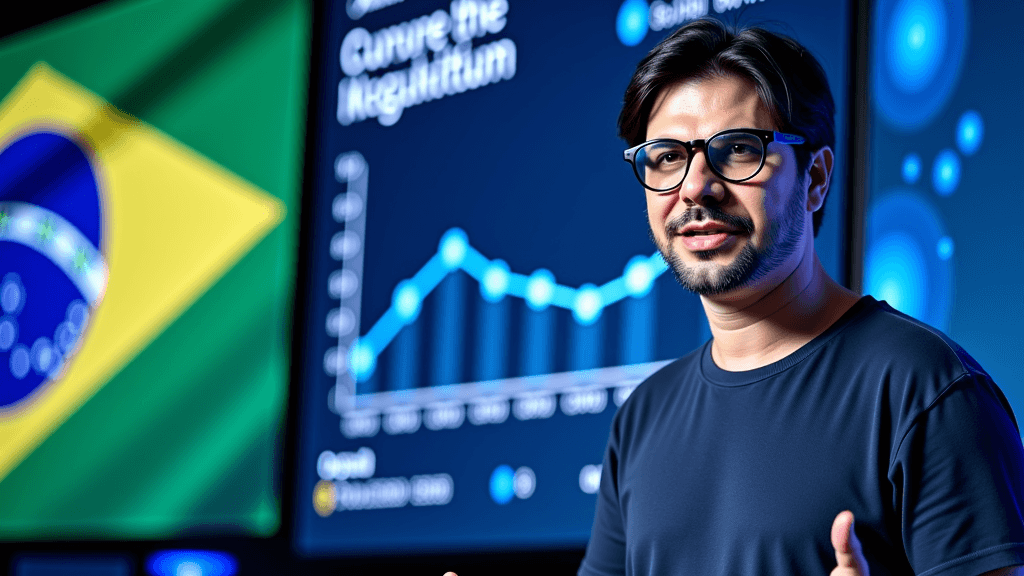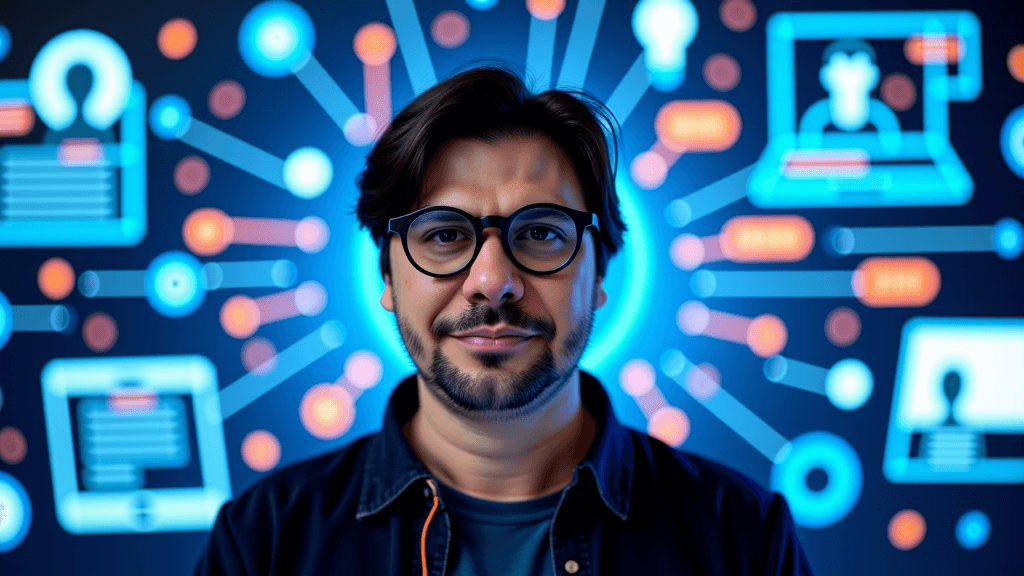All blog posts
Insights on startups, AI, innovation, the future of work and technology education. Practical strategies for impact businesses and digital transformation.
The Brazilian AI Paradox: High Adoption, Deep Inequality, and the Risk of Being Swallowed
March 14, 2025 | by Matos AI
Europe Emerges as the 3rd Force in AI: Will Brazil Be Swallowed or Will It Take Its Place?
March 13, 2025 | by Matos AI
Europe Emerges as 3rd Global AI Force: Is Brazil Ready or Will It Be Swallowed Up?
March 12, 2025 | by Matos AI
AI Market Fragmentation and Democratization of Access: What This Means for Brazil
March 11, 2025 | by Matos AI
AI Radar: Google 'AI Mode', Geopolitics, and the Autonomous Agent Revolution
March 9, 2025 | by Matos AI
AI Radar: Google 'AI Mode', Superintelligence, and China's Battle for AI Dominance
March 7, 2025 | by Matos AI
From AI Marriage to AI Voice Acting: The News That Made the Last 24 Hours
March 6, 2025 | by Matos AI
AI Radar: Between Utopias, Dystopias and the Race for More Accessible Models
March 4, 2025 | by Matos AI
Artificial intelligence is already among us Brazilians. And it is not a timid adoption: according to a recent survey by HSR Specialist Researchers, exclusively released by Época NEGÓCIOS, more than 801% of young people between 18 and 34 years old in Brazil already use generative AI tools. This could be great news – after all, the rapid adoption of emerging technologies is usually an indicator of a country's dynamism and innovative potential.
But the data reveals a paradox that deeply concerns me as someone who has followed the evolution of the Brazilian innovation ecosystem for decades: we are adopting quickly, yes, but in a profoundly unequal way.
The Face of Digital Inequality in the Age of AI
The numbers are revealing: while 95% from class A already use generative AI tools, only 61% from classes C2, D and E have had this opportunity. Education also draws a clear line: 80% of people with a higher education degree use AI, compared to only 31% of those with a high school degree.
This is not just a question of access to technology. As the HSR research, there is a fundamental difference in the perception of capacity: “The upper classes have the perception that they will be able to learn and master technology, which is not so true for the lower classes.”
This is the real digital divide we face: not just unequal access, but inequality in trust and perceived mastery of these tools.
Europe reinvents itself while Brazil hesitates
While we deal with our internal challenges, the global scenario continues to evolve. The European Union, traditionally seen as a regulatory force, has just taken a bold step: it announced investments of 200 billion euros in AI, seeking to position itself as the third major global hub in technology, alongside the US and China.
The European shift is strategic and well-calculated. At the AI Action Summit in France, Europe laid out a plan that goes beyond simple regulation – it wants to stimulate innovation in a range of industries, from pure technology to industrial and aerospace.
The contrast with Brazil is worrying. As experts warn, we run the risk of being “swallowed up” in this new global configuration. We do not have large technology companies, we depend on foreign regulations and, to make matters worse, we are not even close to solving our deep internal digital inequality.
We’ve talked about this before: technological globalization has its winners and losers. The question is: do we really want to be in the latter group?
AI is everywhere, for all audiences
A fascinating aspect of this moment is how AI is infiltrating all sectors and for the most diverse audiences. Let's look at some recent examples:
- THE PlayStation this experimenting with AI models to enhance characters in your games, improving voices and facial movements
- THE McDonald's implemented AI-managed processes to improve the consumer experience and increase customer loyalty
- THE Goal announced investments in AI humanoid robots that can transform the way we interact with technology
- At SXSW, they were presented robotaxis and autonomous vehicles for assisted mobility
From the food we eat to the games we play, from the way we travel to how we interact with machines – AI is reshaping everything. And each of these applications represents opportunities for business and innovation.
China’s emergence as an AI powerhouse
A recent highlight that deserves our attention is the emergence of Manus AI, a new Chinese AI model that is gaining attention for dispensing with the use of complex prompts and focusing on automating creative processes and assisting in decision-making.
The launch of startup Butterfly Effect has already attracted two million people to its waiting list – a clear sign of the global appetite for increasingly accessible and intuitive AI solutions.
This case perfectly illustrates how China remains firmly in the race for leadership in AI, now focusing also on user experience and not just the raw capacity of the models.
The tension between innovation and human labor
As AI advances, so does the debate about its impact on the job market. A recent analysis by State brings up an important point: it is not AI itself that dehumanizes work, but how we choose to implement it.
Technology can either replace professionals or enhance their capabilities. The path we follow depends on decisions we are making now – in companies, public policies and educational institutions.
In my work with startups and corporations, I have consistently argued that we need to think about augmented intelligence, not replacement intelligence. It’s about enhancing what humans do best through technology, not about replacing people with algorithms.
The Battle for Copyright in the Age of AI
Another topic that is gaining momentum is the legal dispute surrounding the use of creative works for AI training. In France, publishers and authors are suing Meta for unauthorized use of literary works in training their models.
This case is just the tip of the iceberg of a debate that will intensify in the coming years: how to balance technological innovation with the protection of intellectual property and fair remuneration for creators?
For Brazilian startups that are developing AI-based solutions, this is an issue that will need to be addressed early on – and that can have a direct impact on their business models.
What can we do to avoid being swallowed?
Given this complex scenario, what path should Brazil follow? How can I contribute as an entrepreneur, and how can you position yourself in this new world? Here are some thoughts:
1. Democratize knowledge about AI
We cannot accept that AI proficiency is the privilege of only a portion of the population. We need training programs that reach all social classes and educational levels. This starts with demystifying the technology and showing practical and accessible applications.
In my mentoring work with startups, I’ve seen that often the biggest obstacle isn’t the technology itself, but the perception that it’s unattainable or too difficult. We need to change that narrative.
2. Develop local AI capacity
We will not have technological sovereignty without investing in local research and development. This means supporting Brazilian startups that are developing AI models adapted to our reality, our language and our specific needs.
Brazil has extraordinary talent in data science and software engineering – we need to create conditions for them to develop technology here, rather than being lured to technology hubs abroad.
3. Prepare our ecosystem for global competition
If Europe is investing €200 billion in AI, we need to find our own way to be competitive. This involves smart public policies, collaboration between academia and industry, and talent development at scale.
My experience leading initiatives such as Startup Farm and Start-Up Brasil has shown me that it is possible to create efficient programs to support the entrepreneurial ecosystem with much more modest resources than those in Europe or the United States – as long as there is focus and continuity.
4. Reevaluate our educational models
We cannot continue to train professionals for a world that no longer exists. Neo-universities and new educational models need to incorporate AI fluency as a core competency for virtually all careers.
The educational change I advocate goes beyond including AI subjects in curricula – it is about completely transforming the way we teach and learn, with a focus on developing creativity, critical thinking and the ability to work alongside intelligent systems.
The future of AI in Brazil depends on the choices we make today
The data is clear: we are at a crossroads. We can either allow AI to deepen existing inequalities, or we can use this transformative technology as leverage to create a more fair and globally competitive country.
In my speaking and consulting sessions, I often discuss how technology itself is neutral—it’s our choices that determine whether it will be a force for good or evil. With AI, this has never been more true.
In my mentoring work with entrepreneurs, I have highlighted that the greatest opportunities lie precisely in using AI to solve major social and economic problems in Brazil. Startups that understand how to apply this technology to issues such as accessible education, preventative healthcare and financial inclusion will not only have a noble purpose, but also a huge potential market.
The Brazilian AI paradox – high adoption, deep inequality – is a challenge, yes. But it is also a call to action. An invitation for businesspeople, educators, policymakers and ordinary citizens to unite around a common vision: a Brazil that uses artificial intelligence not just to consume imported products, but to solve its most pressing problems and position itself as a protagonist on the global stage.
This is the direction in which I have been guiding my projects and investments. And it is on this journey that I invite you to join me.










